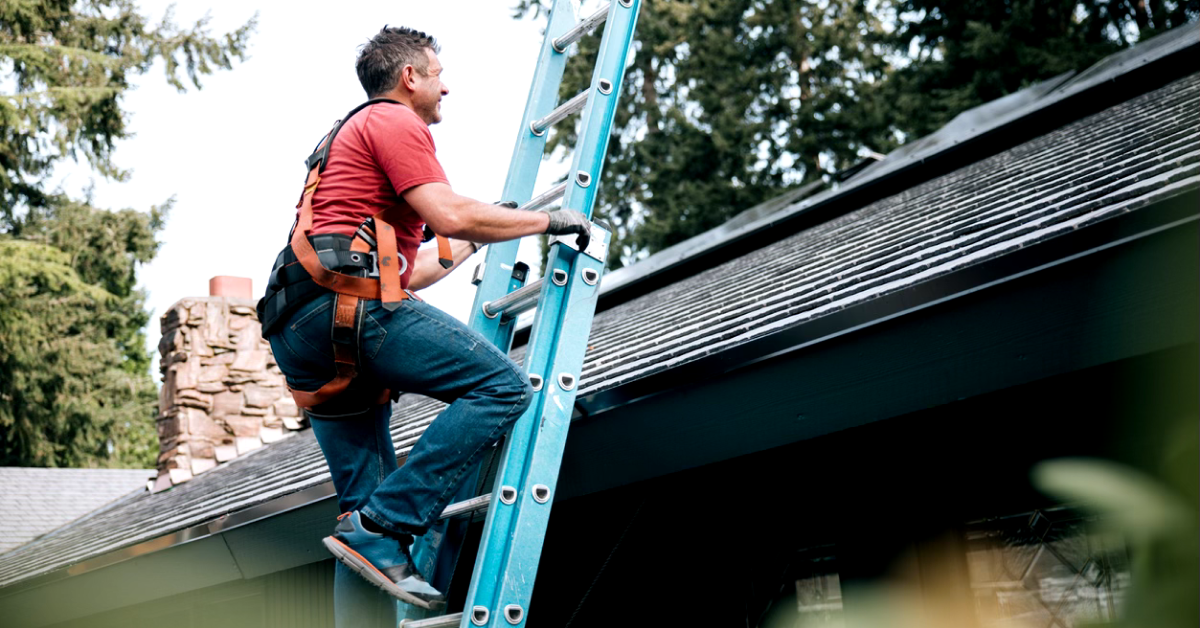The roofing industry is essential for the home improvement market in the United States. With the demand for roof repair, replacement, and upgrades rising, roofing companies across the country are constantly seeking to grow their revenue and profitability. However, the average roofing company revenue depends on several factors, including location, services offered, and business size.
Therefore, let’s explore the current state of the roofing industry and what companies can do to become more profitable. Overall, companies that streamline their processes and drive efficiency can boost revenue and gain a competitive edge.

The State of the Residential Roofing Industry
The residential roofing industry has been growing steadily over the last few years. This growth is largely driven by increasing homeowner demand for roof repairs, replacements, and energy-efficient roofing materials. Another factor boosting this demand is aging housing and severe weather events, causing more roof damage and subsequent repairs.
The roofing industry also benefits from advancements in roofing technology. Today’s roofing materials are more durable, energy-efficient, and environmentally friendly. This appeals to environmentally conscious homeowners.
However, roofing companies also face challenges, including labor shortages and rising material costs. The roofing labor market remains tight, which has led to increased labor costs. This makes it challenging for smaller companies to remain profitable.
Despite these obstacles, many roofing companies are focusing on improving customer service, streamlining operations, and offering flexible financing options to attract more customers. In general, the industry outlook remains positive, with steady demand and new opportunities in both traditional and green roofing solutions. To thrive, roofing companies must adapt to market trends and adopt efficient processes that allow them to capture a larger share of the market in their service area.
Average Roofing Company Revenue in the United States
Determining average roofing company revenue can be challenging, as it varies based on factors like company size, location, and services offered. However, industry data provides insights into revenue benchmarks that can help roofing companies gauge their performance.
According to Roofing Contractor Magazine, the median revenue for roofing companies in recent years ranges from $500,000 to $4.9 million. That’s a pretty wide range that includes everything from small family-owned operations to multi-location businesses.
In general, small roofing companies typically generate annual revenues ranging from $200,000 to $2 million. These smaller companies often have fewer employees and service limited geographic areas. Their revenue depends on local demand, competition, and the number of projects they complete each year.
Medium-sized roofing companies, which may service larger regions, tend to earn between $1 million and $10 million annually. These companies usually have more staff and established customer bases.
Larger roofing companies, often operating on a national scale or in high-demand areas, can bring in over $10 million annually. These companies offer a wider range of services and invest heavily in technology and marketing.
While revenue varies widely, average profit margins for roofing companies generally fall between 20% and 40%. However, companies with inefficient operations, weaker customer relationships, and ineffective marketing strategies can fall much lower.
Location is another key factor; for instance, roofing companies in states with higher housing prices and more frequent severe weather events, like California or Florida, may see higher average revenues compared to those in other regions.
The most profitable roofing companies also offer services like solar roofing and energy-efficient systems, which have higher profit margins than traditional roofing options. These offerings allow them to capture a niche market, which helps boost their annual revenue.
How to Become a Profitable Roofing Company
To achieve and maintain profitability, roofing companies need more than just technical expertise; they must implement a structure and processes that set them up for success. This is the best way to improve the average roofing company revenue.
- Strong Customer Service Focus: Roofing companies with a customer-centric approach often see better reviews and referrals. Clear communication, transparency, and post-project follow-up builds trust and helps secure future business.
- Efficient Operational Structure: A well-organized structure is crucial. Successful roofing companies clearly define roles, delegate tasks, and have streamlined procedures for estimating, scheduling, and project management.
- Smart Financial Management: Profitability requires tight financial control. Roofing companies should monitor expenses closely, accurately estimate project costs, and maintain a healthy cash flow. This allows them to invest in growth while managing risks.
- Investment in Employee Training: A skilled team can increase job quality and efficiency. Companies that invest in training and development often experience fewer errors, improved safety, and higher customer satisfaction.
- Focus on Marketing and Lead Generation: Roofing companies should prioritize lead generation through digital marketing, local SEO, advertising, and social media. Targeted marketing helps reach potential customers and fill the sales pipeline with qualified leads.
By focusing on these points, roofing companies can position themselves to be more profitable. Moreover, they can build strong reputations and attract high-paying customers.
How Management Software is Transforming the Industry
To meet growing demands and improve profitability, many roofing companies are turning to roofing CRMs. These tools offer a range of features that streamline everyday processes, freeing up time and resources that can be directed toward business growth.
Management software helps roofing companies manage projects from start to finish. With easy scheduling, companies can assign the right resources, avoid overbooking, and keep projects on track. This efficiency reduces downtime and increases the number of jobs completed annually.
The right software can also help generate accurate estimates and timely invoicing to maintain cash flow and secure profits. Roofing software allows companies to generate precise estimates, track costs, and send invoices quickly. Many platforms also integrate with accounting software to keep finances in order.
Better yet, you can manage customer interactions, track leads, and follow up on inquiries promptly. An organized CRM ensures that no leads slip through the cracks, boosting the likelihood of closing more sales.
Overall, management software has become a crucial tool for roofing companies looking to streamline operations, minimize errors, and maximize revenue. By investing in technology, roofing companies are staying competitive and adapting to modern customer expectations.
How Leap CRM Helps Roofing Contractors Win and Manage More Jobs
Leap CRM is a powerful tool designed specifically for contractors, providing a range of features that support roofing companies in every stage of their business. In fact, you can better manage every step of every job.
- Efficient project management
- Lead management and customer tracking
- Customer and Subcontractor portals
- Workflow customization
- Quick estimates, proposals, and contracts
- Invoicing and payment processing
- Best in class integrations
Leap CRM makes it easier for roofing companies to generate accurate estimates, turn them into professional proposals, and close deals quickly.
From scheduling to task assignments, Leap CRM enables roofers to manage projects efficiently. The platform ensures all team members know their roles and deadlines, preventing delays and maximizing job completion rates.
It also helps roofing companies maintain relationships with current and potential customers. With built-in tracking and follow-up reminders, it’s easy for teams to stay connected with leads, answer questions, and schedule follow-ups. This helps build long-term customer loyalty.
Leap CRM integrates with popular tools as well, connecting your systems for a seamless workflow. For example, this includes measurement tools, financing lenders, roofing suppliers, manufacturers, and more.
Leap CRM’s intuitive features allow roofing companies to boost efficiency, improve customer satisfaction, and increase profitability. By adopting tools that simplify complex workflows, roofing contractors can take on more jobs and build a better customer experience.
In summary, the average roofing company revenue varies widely. However, it hinges on the company’s ability to manage its processes, maintain high customer satisfaction, and capitalize on industry trends. Investing in efficient structures and software helps roofing companies to optimize their operations, secure more jobs, and improve their bottom line. So, are you ready to take the Leap with your roofing business? If so, fill out the form below and schedule a quick demo with Leap CRM.




